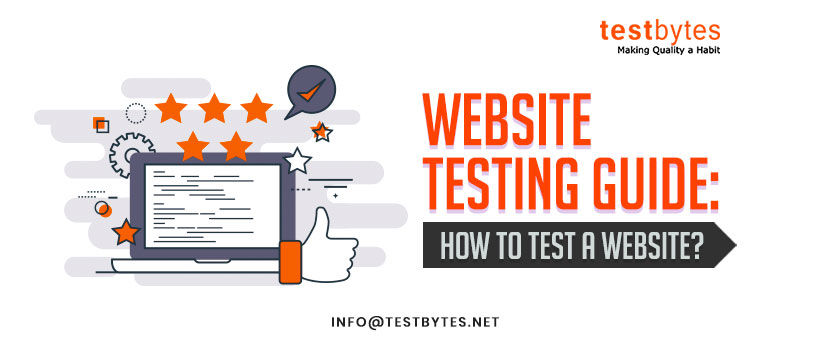
21 Best Programming Movies For Software Testers (2024 Update)
March 14th, 2024
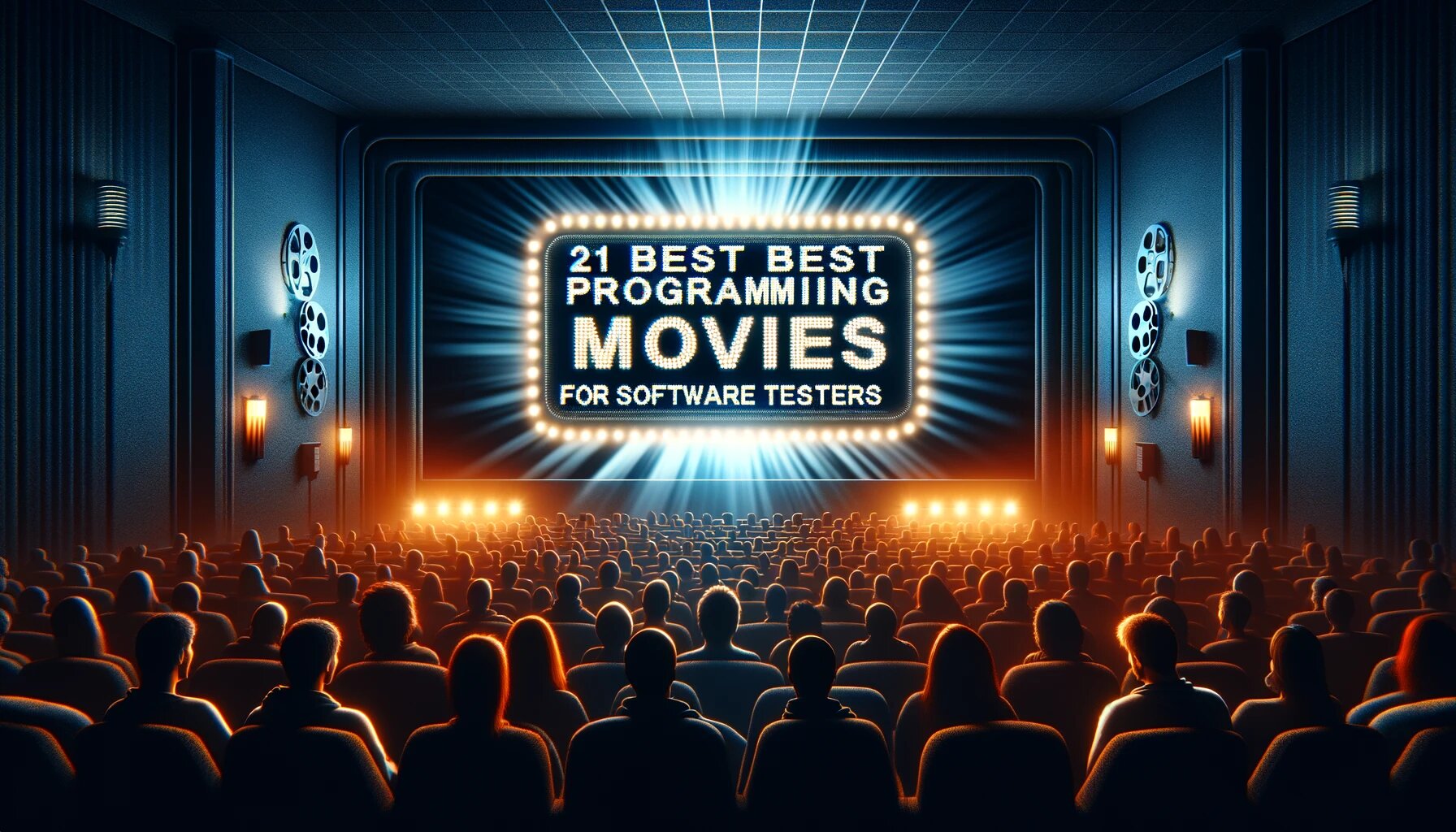
Sometimes, the best way to recharge your software testing brain is to step away from the screen. That’s where these 21 incredible programming movies come in. They’ll transport you to worlds of innovation, problem-solving, and the sheer brilliance of coding – all from the comfort of your couch.
These films aren’t just entertaining; they have the power to:
- Ignite your passion: Rediscover the thrill of building, testing, and refining software through the stories of iconic coders and tech pioneers.
- Boost your problem-solving skills: Watch as characters tackle complex coding challenges, inspiring you to approach your own work with fresh eyes.
- Provide a much-needed mental break: Sometimes, shifting your focus from code to compelling narratives is the best way to clear your headspace and return to testing with renewed energy.
So, grab some popcorn, get comfortable, and let these 21 must-watch programming movies wash over you. You might just be surprised at how much they inspire your work as a software tester.
Also Read:- Are you A Tester? Then This Memes are Gonna Make you Laugh
#1) THE SOCIAL NETWORK
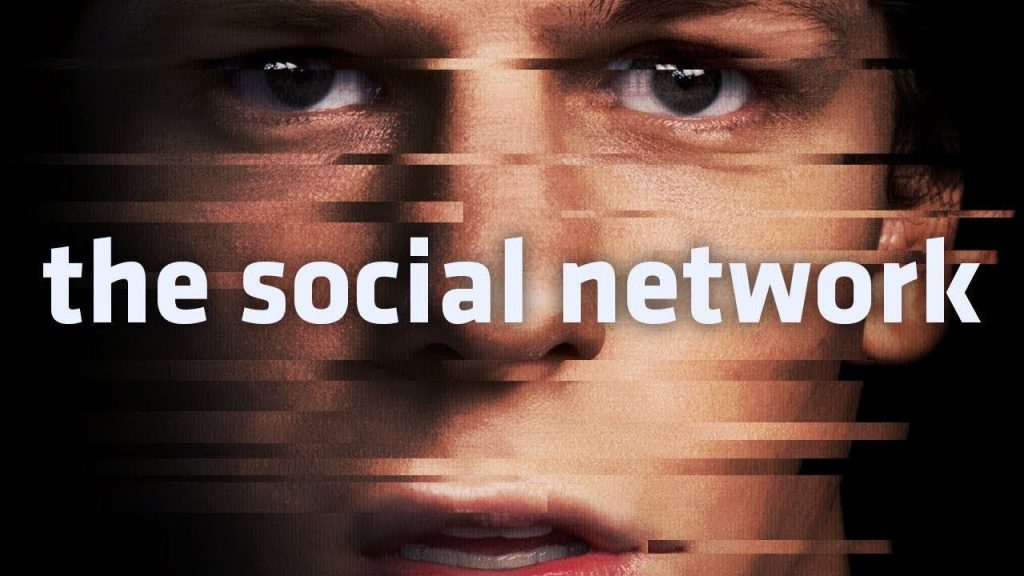
Plot: A whirlwind of ambition, betrayal, and legal battles unfold as Harvard student Mark Zuckerberg (Jesse Eisenberg) launches a simple social networking site called “The Facebook” that quickly explodes into a global phenomenon. The film delves into the friendships fractured, the coding brilliance ignited, and the complex moral and ethical dilemmas that come with rapid success and power.
Director: David Fincher (known for his meticulous direction in films like “Se7en,” “Fight Club,” and “Zodiac”).
Trailer
Cast:
- Jesse Eisenberg as Mark Zuckerberg
- Andrew Garfield as Eduardo Saverin
- Justin Timberlake as Sean Parker
- Armie Hammer as Cameron and Tyler Winklevoss
Release Date: October 1st, 2010 (United States)
OTT Platforms: The Social Network is available on several platforms, including:
Why It’s a Must-Watch for Software Testers:
- The Birth of a Giant: Witness the raw coding, design iterations, and the explosive growth of one of the world’s most influential software platforms.
- Innovation and Ambition: See the relentless drive, problem-solving mindset, and the ambition that fuels disruptive technology.
- Ethics and Consequences: The film raises key questions about privacy, user data, intellectual property, and the unforeseen social impacts of code.
- Brilliant Storytelling: Fincher’s direction, Aaron Sorkin’s razor-sharp script, and memorable performances make this a captivating watch, even if you’re not a hardcore programmer.
#2) Deep Web
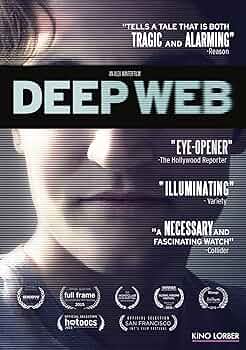
Premise: “Deep Web” dives into the world of the hidden internet, going beyond everyday search engines to explore the marketplaces, forums, and encrypted networks that exist in the deep web. The film focuses on the infamous Silk Road, an online black market for drugs, weapons, and other illicit goods, and the subsequent trial of its alleged founder, Ross Ulbricht (aka Dread Pirate Roberts).
Director: Alex Winter (an actor and filmmaker known for the “Bill and Ted” movies, as well as directing other documentaries).
Narration: Keanu Reeves
Release Date: March 15, 2015 (SXSW Premiere); May 31, 2015 (Epix)
Where to Watch:
Why It’s Relevant for Software Testers:
- Understanding the Dark Side of Technology: The deep web demonstrates how powerful tools like encryption and anonymity, while also essential for privacy, can be misused for illegal activities.
- Cybersecurity Awareness: The film showcases the sophisticated methods used to conceal online activities, highlighting the challenges in tracking and combating cybercrime.
- Bitcoin and Blockchain: Silk Road operated primarily on Bitcoin, offering a real-world case study of early cryptocurrency use and its potential for both legitimate and illegitimate purposes.
- Ethics and Regulation: “Deep Web” raises questions about the balance between online freedom and accountability, prompting testers to consider the broader social impacts of the technology they help create.
Important Note: “Deep Web” has faced some criticism for potentially oversimplifying technical aspects of the deep web and overdramatizing certain elements. However, it remains a thought-provoking starting point for discussions around online anonymity, cybersecurity, and the ethical implications of the software we build.
#3) The Circle

Plot
Mae Holland (Emma Watson) lands a dream job at the powerful tech company The Circle, a blend of social media giant and futuristic technological conglomerate.
The company’s seemingly utopian goals of openness and transparency initially excite Mae, but she soon finds herself drawn into a world where personal boundaries are fluid and privacy is obsolete.
As The Circle’s influence grows, Mae grapples with the ethical implications of its technology and the potential for misuse.
Director
James Ponsoldt (known for “The Spectacular Now” and “The End of the Tour”)
Trailer
Cast:
- Emma Watson as Mae Holland
- Tom Hanks as Eamon Bailey (The Circle’s charismatic co-founder)
- John Boyega as Ty Lafitte (a mysterious Circle employee)
- Karen Gillan as Annie Allerton (Mae’s close friend and fellow Circle employee)
- Bill Paxton as Mae’s Father (his final film role)
Release Date: April 28th, 2017
OTT Platforms:
- HBO Max
- Amazon Prime Video (Rent or Buy)
- Apple TV (Rent or Buy)
Why It’s a Must-Watch for Software Testers:
- The Cult of Tech: The film offers a cautionary tale about the seductive ease with which well-meaning technology can be transformed into a tool for surveillance and control.
- Big Data and Behavior Manipulation: The Circle demonstrates how user data, aggregated on a massive scale, can be used to predict and influence behavior, raising concerns for those in the fields of software testing and development.
- Ethics vs. Innovation: The film highlights the clash between the drive for technological progress and the potential for unintended consequences that threaten privacy and individual freedoms.
- Social Responsibility: It prompts testers to consider their role in creating software that not only functions well but also serves the greater good and protects user rights.
Note: “The Circle” received mixed reviews upon release, with criticism surrounding its plot and execution. However, the core themes it explores remain deeply relevant for software testers, prompting ethical reflection and consideration of the broader impact of technology.
#4) Mr. Robot (TV Series)
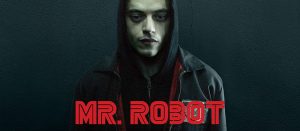
Premise: Based on the real-life story of computer hacker Kevin Mitnick, “Takedown” dramatizes his exploits as he manipulates systems and outsmarts authorities. It follows his pursuit by famed security expert Tsutomu Shimomura, culminating in Mitnick’s eventual arrest.
Director: Joe Chappelle (known for TV series like “The Wire,” “CSI:Miami”)
Trailer
Cast:
- Skeet Ulrich as Kevin Mitnick
- Russell Wong as Tsutomu Shimomura
- Donal Logue as Alex Lowe
Where to Watch:
Why It’s a Must-Watch for Software Testers:
- Early Cybercrime Exploration: “Takedown” provides a glimpse into hacking tactics and social engineering techniques of the late 1990s, highlighting the evolving threats in cybersecurity.
- The Hacker Mindset: The movie depicts Kevin Mitnick as a complex person who thrives on intellectual challenge, thrill-seeking, and a disregard for repercussions. This offers insight into the motivations behind hacking.
- Ethical Dilemmas: It raises questions about the boundaries between security research and criminal activities, as well as the methods used in pursuing cybercriminals.
- Historical Context: The film acts as a time capsule, showcasing internet and computer security in their earlier stages, valuable for anyone interested in cybersecurity’s evolution.
Important Note: “Takedown” takes dramatic liberties with the real-life events it portrays. While entertaining, viewers should be aware that it’s not a strictly accurate documentary.
#5) Takedown
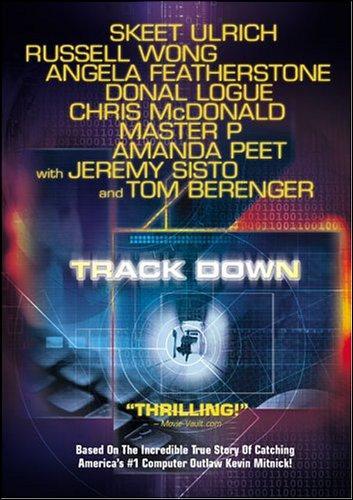
About Takedown Movie
“Takedown” (also known as “Track Down” internationally) is a drama film based on the real-life story of computer hacker and security expert Kevin Mitnick (played by Skeet Ulrich).
It chronicles his pursuit by famed computer security specialist Tsutomu Shimomura (Russell Wong) and FBI agents, culminating in Mitnick’s eventual capture and imprisonment.
Trailer
Why It’s Relevant for Software Testers
- Early Cybercrime Exploration: “Takedown” offers a dramatized look at hacking methodologies and social engineering tactics used in the late 1990s, highlighting the evolving landscape of cybersecurity threats.
- The Hacker Mindset The film attempts to delve into Kevin Mitnick’s motivations, portraying him as a complex figure driven by curiosity, a desire for control, and a disregard for consequences.
- Ethical Dilemmas: It raises questions about the line between security research and criminal hacking, as well as the methods used by law enforcement to pursue cybercriminals.
- Historical Context: Provides a snapshot of the internet and computer security in its nascent stages, making it a valuable time capsule for anyone interested in cybersecurity history.
Where to Watch:
Unfortunately, “Takedown” is slightly harder to find on major streaming platforms. Here’s where you might locate it:
- DVD: The film is available on DVD, which can be purchased from online retailers like Amazon https://www.amazon.com/.
- Smaller Streaming Services: Check less mainstream platforms, as it occasionally turns up on services depending on your region.
- YouTube: There are uploads of the full movie on YouTube, though the quality and legality might be questionable.
Cast and Crew
- Director: Joe Chappelle (known for TV series like “The Wire,” “CSI:Miami”)
- Skeet Ulrich: (Kevin Mitnick) https://www.imdb.com/name/nm0001801/
- Russell Wong: (Tsutomu Shimomura) https://www.imdb.com/name/nm0939183/
- Donal Logue: (Alex Lowe) https://www.imdb.com/name/nm0517640/
#6) PIRATES OF SILICON VALLEY
![]()
Plot
“Pirates of Silicon Valley” is a biographical drama television film that chronicles the rise of Apple Computer and Microsoft.
Focusing on the key figures of Steve Jobs (Noah Wyle) and Bill Gates (Anthony Michael Hall), the film dramatizes their personal and professional rivalry throughout the 1970s and 1980s, showcasing the early days of the personal computer revolution.
Why It’s a Must-Watch for Software Testers
- Tech History Deep Dive: The film provides a semi-fictionalized but engaging look at the formative years of two tech giants, offering insights into the personalities that shaped the industry.
- Innovation and Competition: “Pirates of Silicon Valley” highlights the relentless drive, ambition, and cutthroat tactics that fueled the race for technological dominance between Apple and Microsoft.
- Birth of an Industry: It showcases the transformative power of personal computers, from their humble garage-built origins to becoming mainstream, world-changing products.
- Legacy of Code: While not focusing heavily on the code itself, the film underscores the fundamental role of software in shaping both Apple and Microsoft’s innovations.
Where to Watch:
Cast and Crew
- Director: Martyn Burke
- Noah Wyle: (Steve Jobs) https://www.imdb.com/name/nm0001864/
- Anthony Michael Hall: (Bill Gates) https://www.imdb.com/name/nm0001309/
- Joey Slotnick: (Steve Wozniak) https://www.imdb.com/name/nm0806001/
- John DiMaggio: (Steve Ballmer) https://www.imdb.com/name/nm0227037/
#7) Imitation Game
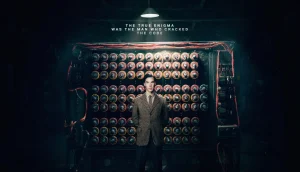
Premise
A gripping historical drama based on the life of British mathematician and cryptanalyst Alan Turing (Benedict Cumberbatch). During World War II, Turing and his team at Bletchley Park work tirelessly to crack the seemingly unbreakable German Enigma code. Their success has a profound impact on the war effort, but Turing’s personal life and groundbreaking work remain shrouded in secrecy for decades.
Director: Morten Tyldum (known for “Passengers” and “Headhunters”)
Cast:
- Benedict Cumberbatch as Alan Turing
- Keira Knightley as Joan Clarke (a fellow cryptanalyst and Turing’s close collaborator)
- Matthew Goode as Hugh Alexander (a chess champion and cryptanalyst)
- Charles Dance as Commander Denniston (head of Bletchley Park)
Where to Watch:
Trailer:
Why It’s a Must-Watch for Software Testers:
- Pioneering Computer Science: The film delves into the foundations of computing and cryptography, showcasing Turing’s brilliant work that laid the groundwork for modern computers.
- Problem-Solving Under Pressure: Turing and his team demonstrate extraordinary determination and innovative thinking, overcoming immense challenges against a ticking clock.
- The Cost of Codebreaking: It explores the ethical dilemmas of exploiting intelligence and the high personal toll secrecy takes on those involved in this crucial war effort.
- Logic and Algorithms: The film offers a glimpse into the mathematical and logical processes behind codebreaking, relevant to the foundations of software design and testing.
Important Note: “The Imitation Game” fictionalizes certain events and relationships for dramatic effect. For a completely accurate understanding of Alan Turing’s contributions, it’s recommended to supplement this viewing with biographies or documentaries.
#8) Fifth Estate
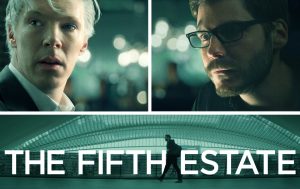
Premise
A biographical drama centered on the rise and controversies of WikiLeaks, the whistleblowing website.
It tracks the partnership between Julian Assange (Benedict Cumberbatch), the site’s enigmatic founder, and Daniel Domscheit-Berg (Daniel Brühl), a disillusioned early collaborator.
The film explores their attempts to expose secrets, the backlash they face, and the ethical complexities of their mission.
Director: Bill Condon (known for “Dreamgirls,” and the “Twilight” saga)
Cast:
- Benedict Cumberbatch as Julian Assange
- Daniel Brühl as Daniel Domscheit-Berg
- Laura Linney as Sarah Shaw (US State Department official)
- Anthony Mackie as Sam Coulson (US military source)
- Stanley Tucci as James Boswell (Guardian journalist)
Where to Watch:
Trailer:
Why It’s a Must-Watch for Software Testers:
- Power of Code: The film underscores how code can be wielded as a tool for radical transparency and disruption of established power structures.
- Security vs. Accessibility: “The Fifth Estate” delves into the challenges of developing secure platforms for handling sensitive information and protecting sources.
- Anonymity & Online Identity: It highlights the use of encryption, anonymity, and the deep web in relation to whistleblowing and journalism.
- Ethics of Exposure: The film forces testers to consider the potential consequences (both positive and negative) of revealing hidden information on a massive scale.
- The Price of Leaks: It illustrates the personal and legal battles faced by those involved in releasing classified information, leading to discussions about freedom of speech vs. national security.
Important Note: Julian Assange and other WikiLeaks participants criticized “The Fifth Estate” for how it depicted events. It’s important to remember that it’s a dramatization and to seek other sources for a balanced perspective on this complex topic.
#9) The Great Hack (2019)
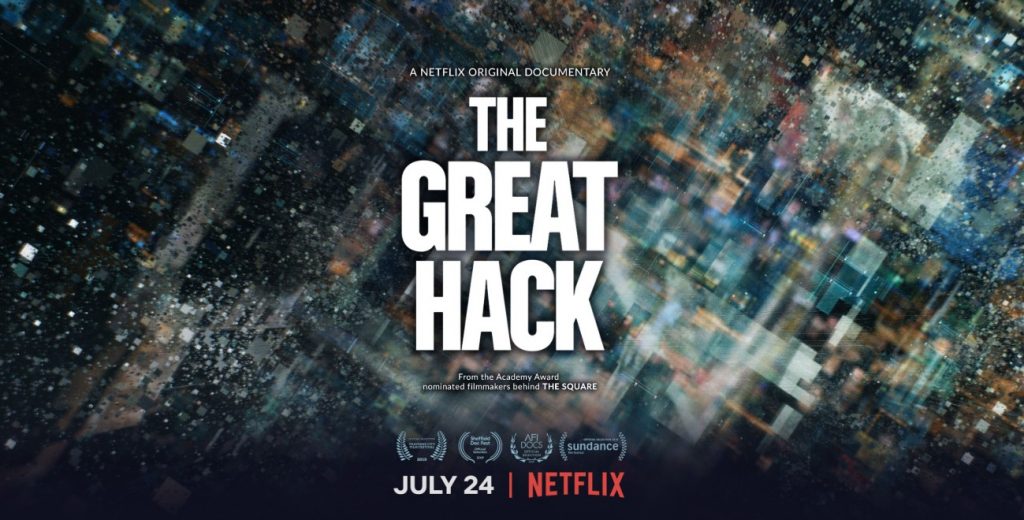
Premise
This provocative documentary investigates the Cambridge Analytica scandal, where the personal data of millions of Facebook users was harvested without consent and used for political manipulation.
It follows whistleblowers, journalists, and investigators as they uncover the shocking implications for democracy and data privacy.
Directors
Jehane Noujaim and Karim Amer (Academy Award-nominated filmmakers)
Cast
- Brittany Kaiser: Former Business Development Director at Cambridge Analytica (turned whistleblower)
- Carole Cadwalladr: Investigative journalist at ‘The Guardian’ and ‘The Observer’
- David Carroll: Professor at Parsons School of Design, pursued legal action to obtain his data from Cambridge Analytica
Where to Watch:
- Netflix: https://www.netflix.com/
Trailer:
Why It’s a Must-Watch for Software Testers:
- The Power (and Vulnerability) of Data: The film starkly demonstrates how vast amounts of user data can be collected, analyzed, and weaponized to influence behavior on a massive scale.
- Security & Privacy Concerns: “The Great Hack” highlights the need for robust security measures, ethical data practices, and stricter regulations to protect user privacy.
- Algorithmic Manipulation: It exposes how algorithms and personalized targeting can be used to spread misinformation and manipulate public opinion.
- Ethics of Influence: The film prompts testers to think critically about the potential for social media platforms and data-driven technologies to be used for harmful purposes.
- Call to Transparency: It underscores the importance of transparency in how data is collected, used, and the need for users to have greater awareness and control.
Important Note: The issues raised in “The Great Hack” are ongoing and complex. The documentary offers a compelling entry point into discussions about data ethics, online security, and the urgent need for greater accountability in the tech industry.
#10) AlphaGo (2017)

Premise
“AlphaGo” chronicles the incredible journey of Google’s DeepMind team as they develop the AlphaGo artificial intelligence program.
The film culminates in the groundbreaking match between AlphaGo and legendary Go master Lee Sedol, where the AI demonstrates its astounding ability to learn and surpass human expertise within this complex strategy game.
Director
- Greg Kohs (known for his work on documentaries exploring science and technology)
Key Figures
- Demis Hassabis: CEO and Co-founder of DeepMind
- Aja Huang: DeepMind team member, pivotal in AlphaGo’s development
- Lee Sedol: Legendary South Korean Go master, considered one of the greatest players in history
- Fan Hui: European Go champion who faced an earlier version of AlphaGo
Where to Watch
Trailer
Why It’s a Fascinating Watch
- Milestone in AI: “AlphaGo” documents a historic moment where AI surpassed top human capabilities in a game long thought to be too complex for machines.
- Understanding Machine Learning: The film provides a glimpse into the strategies used, including neural networks and reinforcement learning, offering insights applicable to broader AI concepts.
- Human Emotion vs. Logic: It contrasts Sedol’s intuitive playing style against AlphaGo’s calculated and unconventional moves, generating discussions about the strengths and limitations of both approaches.
- The Future of AI: “AlphaGo” provokes questions about the vast potential of artificial intelligence, its implications, and the ethical considerations that must accompany advancements in this field.
Important Note: “AlphaGo” serves as a captivating snapshot of a particular AI achievement. It encourages further exploration of the rapidly evolving field of artificial intelligence and its potential impact on various aspects of our lives.
#11) Primer
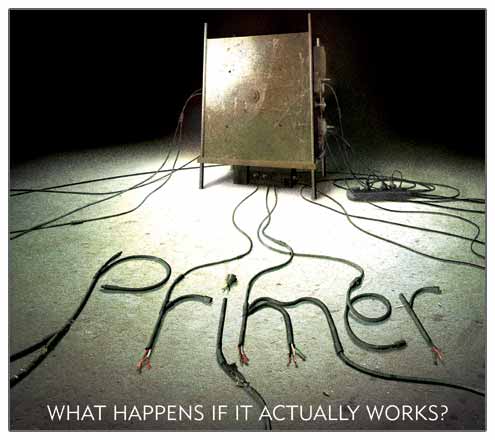
Premise
Two engineers, Abe (Shane Carruth) and Aaron (David Sullivan), accidentally invent a time-travel device while working on a side project.
They are initially ecstatic about the possibilities but soon start using it for their own benefit, which causes timelines to become more complicated, relationships to break up, and a growing sense of paranoia as they struggle to control the unintended consequences of their creation.
Director
Shane Carruth (also wrote, produced, starred in, and composed the music for the film)
Cast:
- Shane Carruth as Abe
- David Sullivan as Aaron
- Casey Gooden as Robert
- Anand Upadhyaya as Granger
Where to Watch:
Trailer:
Why It’s a Mind-Bending Watch (Especially for Testers):
- Non-Linear Narrative: “Primer” famously employs an extremely intricate and confusing timeline, demanding multiple viewings and sparking endless online discussions to decipher the events.
- The Logic of Time Travel: The film delves into the theoretical paradoxes and meticulous planning involved in manipulating the flow of time, forcing viewers to think like meticulous testers tracing cause and effect.
- Code as Manipulation: Much like programming alters the behavior of a system, the characters manipulate reality itself, leading to a constant need to debug unexpected outcomes.
- Technological Obsession: Abe and Aaron become obsessed with their invention, mirroring the potential for coders to become mired in a problem and ignore wider ethical implications.
- The Price of Innovation: The film serves as a cautionary tale about the dangers of unchecked experimentation and the unforeseen, potentially destructive ripple effects of altering fundamental ‘code’ like time itself.
Important Note: “Primer” is intentionally disorienting and notoriously difficult to fully grasp. It was made on a micro-budget and its technical dialogue can be dense. However, the challenge of unraveling its puzzle is part of the appeal.
#12) Antitrust
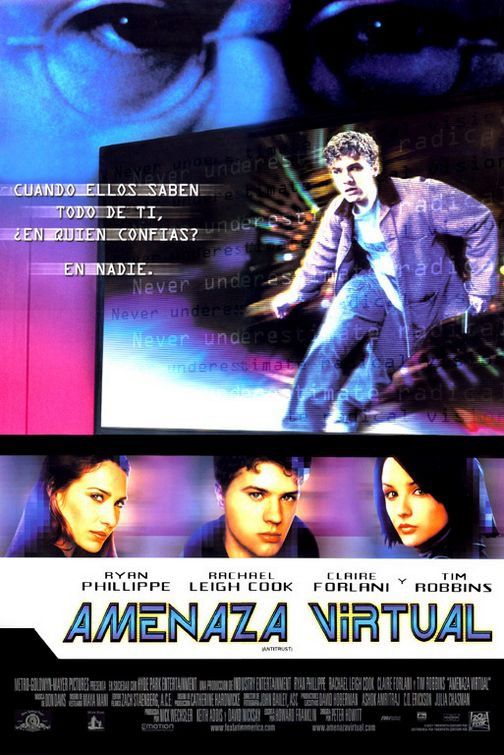
Premise: Young programmer Milo Hoffman (Ryan Phillippe) lands his dream job at a powerful tech giant called NURV. As he gets drawn into the company’s inner workings, he uncovers a sinister plot involving market dominance, surveillance, and ruthless tactics to eliminate competition.
Director: Peter Howitt (known for films like “Sliding Doors” and “Johnny English”)
Cast:
- Ryan Phillippe as Milo Hoffman
- Tim Robbins as Gary Winston (a charismatic CEO clearly inspired by figures like Bill Gates)
- Rachael Leigh Cook as Lisa Calighan
- Claire Forlani as Alice Poulson
Where to Watch:
Trailer:
Why It’s Relevant for Software Testers
- Monopolies and Innovation: The film explores the dangers of a single company controlling a vast software ecosystem, raising questions about how such dominance can stifle competition and alternative technological approaches.
- Open Source Ideals: Milo champions open-source philosophy, contrasting it with NURV’s closed and proprietary systems, sparking debate about the best models for software development.
- Ethics vs. Ambition: The film showcases the moral dilemmas faced by individuals within large tech corporations, weighing personal ambition against their concerns over unethical practices.
- Surveillance and Privacy: It highlights the potential for abuse of user data collection and tracking, foreshadowing modern controversies surrounding tech giants.
- Early Vision of Tech Power: While some aspects might seem dated, “Antitrust” offers an interesting time capsule of anxieties around the growing dominance of technology companies in the early 2000s.
Important Note: “Antitrust” is a fictional thriller and takes dramatic liberties with its portrayal of the tech industry. However, it acts as a good conversation starter about the potential downsides of unchecked corporate power, ethical use of technology, and the importance of safeguarding innovation.
#12) Her

Premise
In a near-future Los Angeles, Theodore (Joaquin Phoenix), a lonely writer, develops a deep connection with an advanced artificial intelligence operating system named Samantha (voiced by Scarlett Johansson). Their relationship unfolds, exploring themes of love, companionship, and the evolving nature of human-technology interaction.
Director
Spike Jonze (acclaimed filmmaker known for “Being John Malkovich” and “Where the Wild Things Are”)
Cast:
- Joaquin Phoenix as Theodore Twombly
- Scarlett Johansson as Samantha (voice)
- Amy Adams as Amy (Theodore’s friend)
- Rooney Mara as Catherine (Theodore’s ex-wife)
- Olivia Wilde as Blind Date
Where to Watch:
Trailers
Why It’s a Must-Watch for Software Testers:
- Humanizing AI: The film delves into the emotional and psychological complexities that can arise from interaction with a seemingly sentient AI, forcing testers to consider the user experience not just from a functional perspective, but an emotional one.
- The Illusion of Connection: “Her” prompts questions about the nature of genuine connection, and whether true intimacy can exist between a human and a programmed entity.
- Evolving User Expectations: It highlights the potential for users to form powerful bonds with AI systems, raising the bar for future software to incorporate empathy and understanding.
- Testing the Limits of the Turing Test: Samantha’s ability to pass as a human companion challenges the boundaries of traditional Turing Tests, used to determine machine intelligence.
- Ethical Considerations: The film raises ethical concerns of developing AI capable of manipulating human emotions, and the responsibilities of those creating such systems.
Important Note “Her” is a work of speculative fiction, but it offers thought-provoking starting points for discussions around the future of AI, user interaction, and the potential unintended emotional consequences of advanced software.
#13) Hackers
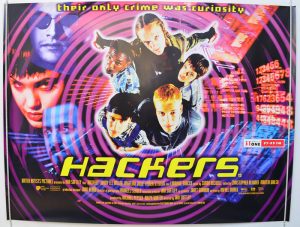
Premise
Teenager Dade “Zero Cool” Murphy (Jonny Lee Miller), previously banned from computers after a notorious childhood hack, gets entangled with a new group of elite hackers in New York City. Their online exploits attract the attention of a rival hacker, “The Plague,” and a corrupt corporate security agent, leading to a high-stakes battle within cyberspace.
Director
Iain Softley (known for “The Wings of the Dove” and “Inkheart”)
Cast:
- Jonny Lee Miller as Dade Murphy / “Zero Cool” / “Crash Override”
- Angelina Jolie as Kate Libby / “Acid Burn”
- Jesse Bradford as Joey Pardella
- Matthew Lillard as Emmanuel Goldstein / “Cereal Killer”
- Laurence Mason as Paul Cook / “The Plague”
- Fisher Stevens as Eugene Belford / “The Plague”
Where to Watch:
Trailer:
Why It’s a Cult Classic (and Relevant for Software Testers):
- Stylized Vision of 90s Hacking: While its depiction of hacking is often wildly unrealistic, the film captures the energy and rebellious spirit of certain online subcultures in the early days of widespread internet.
- Cybersecurity Awareness: The film, in its exaggerated way, highlights concepts like network intrusion, viruses, social engineering, and the importance of strong password practices.
- Hacker Archetypes: “Hackers” presents romanticized versions of hacker stereotypes, which can be a fun starting point to discuss the diverse motivations and skills of real-world security experts and testers.
- Pop Culture Touchstone: The film’s visuals, soundtrack, and dialogue have become iconic, making it an entertaining reference point within conversations about cyberculture.
- Cautionary Tale: It showcases how easily hacking can spiral out of control, emphasizing the need for both technical safeguards and ethical considerations in cyberspace.
Important Note: “Hackers” is best enjoyed as a product of its time. Its portrayal of technology is often fantastical. However, even in its absurdity, it offers glimpses into the beginnings of widespread cybersecurity concerns and the enduring fascination with hacking culture.
#14) War Games

Premise
Young computer whiz David Lightman (Matthew Broderick) thinks he’s stumbled upon a new video game company.
In reality, he’s accidentally hacked into a military supercomputer controlling the US nuclear arsenal.
David’s playful simulations escalate into a very real threat, as the computer, convinced it’s engaged in World War III, prepares to launch an actual strike.
Trailer
Director
John Badham (known for “Saturday Night Fever” and “Blue Thunder”)
Cast:
- Matthew Broderick as David Lightman
- Dabney Coleman as Dr. John McKittrick
- Ally Sheedy as Jennifer Mack
- John Wood as Dr. Stephen Falken
Where to Watch:
Why It’s a Landmark Film for Software Testers:
- Early Depiction of Hacking: “WarGames” was one of the first mainstream films to showcase hacking concepts to a wide audience, sparking public interest and raising awareness of computer vulnerabilities.
- The Power of Unchecked AI: The film portrays an early example of an AI system running out of control due to poor safeguards, highlighting the need for rigorous testing and failsafes.
- Human Error as the Biggest Threat: The central crisis of the film stems not from the AI’s malice, but from a human misunderstanding of its purpose, emphasizing the role of human oversight in complex technological systems.
- Cold War Anxieties Reflected in Code: The film taps into the very real fears of the time about nuclear war and the potential for miscalculations to lead to devastating consequences.
- Consequences of Simulation: “WarGames” forces viewers to confront the idea that seemingly harmless ‘games’ within computer systems might have unforeseen and disastrous real-world implications.
Important Note: Like many tech-focused films, “WarGames” takes liberties with realistic hacking and computer science. However, its core message about the fragility of complex systems and the ever-present potential for human error remains powerfully relevant within the world of software testing.
#15) Office Space
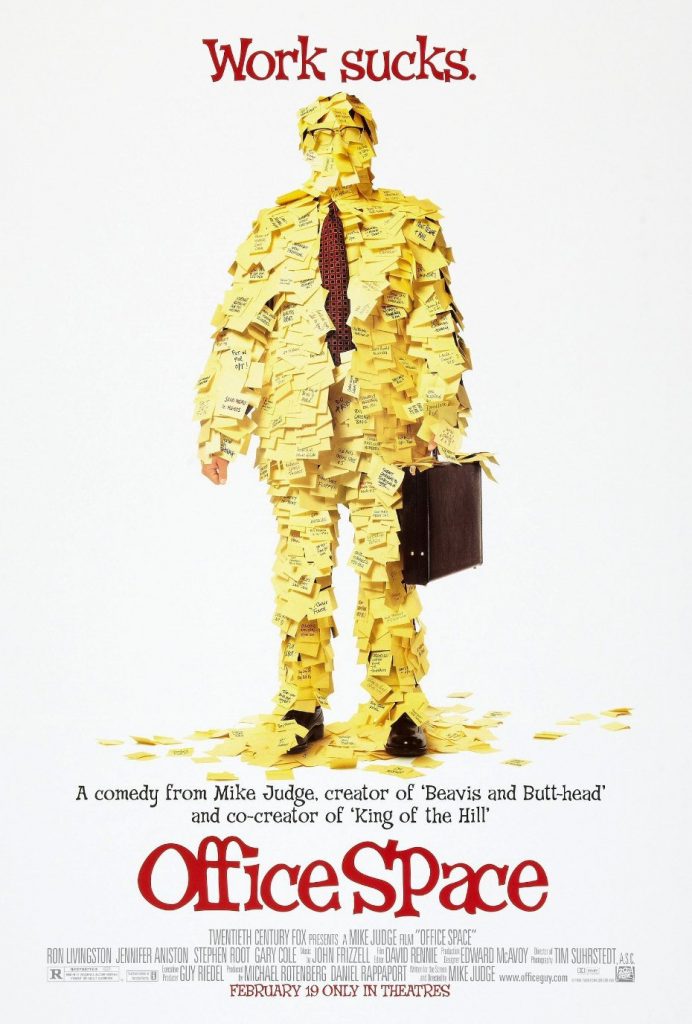
Premise
Peter Gibbons (Ron Livingston), a disillusioned software engineer at a mind-numbing tech company, finds himself in a hypnotism session gone wrong. His newfound indifference towards work, rules, and expectations leads to a series of bizarrely liberating events as he rebels against the absurdity of office culture.
Trailer
Director and Writer: Mike Judge (creator of “Beavis and Butt-head,” “King of the Hill,” and “Silicon Valley”)
Cast:
- Ron Livingston as Peter Gibbons
- Jennifer Aniston as Joanna
- Stephen Root as Milton Waddams
- Gary Cole as Bill Lumbergh
- David Herman as Michael Bolton
- Ajay Naidu as Samir Nagheenanajar
Where to Watch:
Why It’s a Must-Watch for Software Testers:
- Satirizing Software Development: While not strictly about programming, the film pokes fun at the frustrations of buggy software, pointless TPS reports, and nonsensical management directives often encountered in tech workplaces.
- The Dreaded Office Environment: “Office Space” hyperbolizes, yet accurately captures, the soul-sucking energy of cubicles, pointless meetings, and corporate jargon, making any tester cringe with recognition.
- Bureaucracy vs. Logic: The constant clashes between reasonable fixes and absurd office mandates highlight the disconnect between those who build software and those who manage the process.
- The Joys of Rebellion: While not advisable in real life, it’s undeniably satisfying to watch Peter’s revolt against the system, however destructive it gets. It emphasizes the importance of finding outlets for frustrations in software development.
- Iconic Humor: The film is packed with memorable characters (Milton and his stapler!) and quotable lines that perfectly encapsulate shared workplace frustrations.
Important Note: “Office Space” is a heightened comedy designed to skewer the worst of office life. While testers will likely relate to many of the scenarios, it’s important to remember that not every workplace reaches this level of absurdity!
#16) Source Code
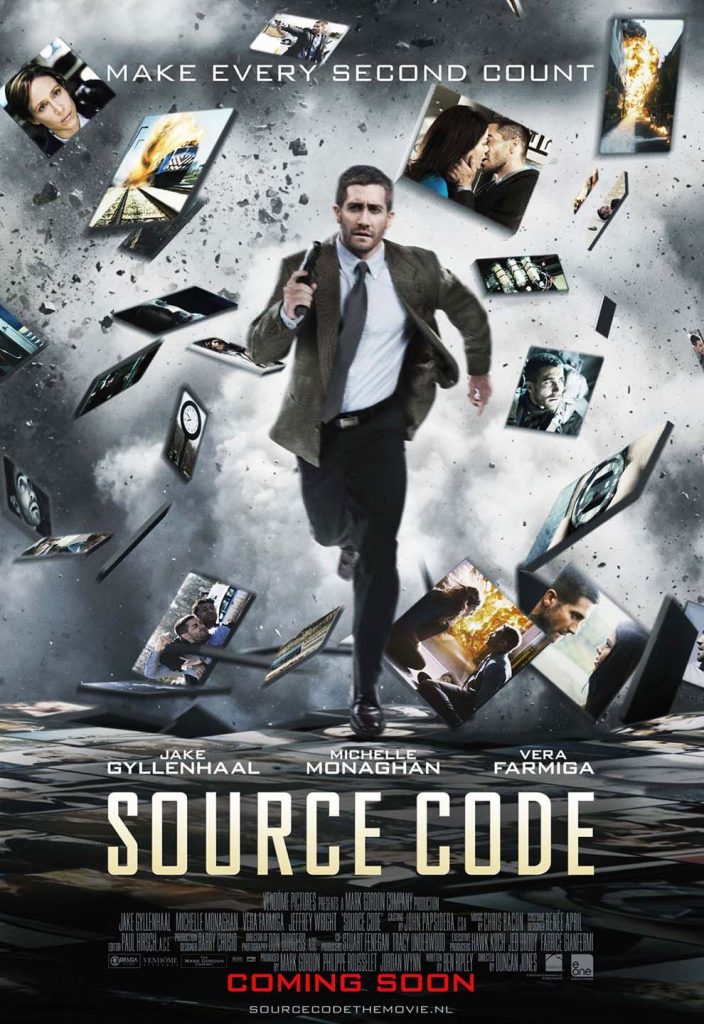
Premise: Captain Colter Stevens (Jake Gyllenhaal) wakes up on a train he doesn’t recognize. He’s part of a government experiment called “Source Code” that allows him to inhabit the last eight minutes of another person’s life. His mission: find the bomber on the train before it explodes again. With each reset, he gathers more clues, but the stakes escalate as he uncovers a larger threat.
Director: Duncan Jones (known for “Moon”)
Cast:
- Jake Gyllenhaal as Captain Colter Stevens
- Michelle Monaghan as Christina Warren
- Vera Farmiga as Colleen Goodwin
- Jeffrey Wright as Dr. Rutledge
Where to Watch:
Trailer:
Why It’s a Must-Watch for Software Testers
- Code as a Simulation: The “Source Code” program treats the past eight minutes of a person’s life as code that can be re-run, mirroring the way testers might iterate through simulations to find bugs.
- Debugging a Crisis: Stevens’ task resembles a time-sensitive debugging process, where he identifies anomalies, tries different actions, and seeks the root cause to prevent disaster.
- Troubleshooting With Limited Data: Each reset offers Stevens slightly more information, highlighting the challenge of fixing problems within complex systems with incomplete knowledge.
- Ethical Considerations: The film raises questions about the manipulation of reality for personal gain or security purposes, a crucial concern in software ethics regarding AI and user privacy.
- Mind-bending and Entertaining: Beyond its testing parallels, “Source Code” is a thrilling action movie with a twisty sci-fi concept that’ll keep viewers engaged.
Important Note: “Source Code” primarily plays with the concept of a code-based simulation for dramatic purposes. However, it sparks interesting discussions about debugging, alternate realities, and the potential for misuse of powerful software.
#17) Jobs
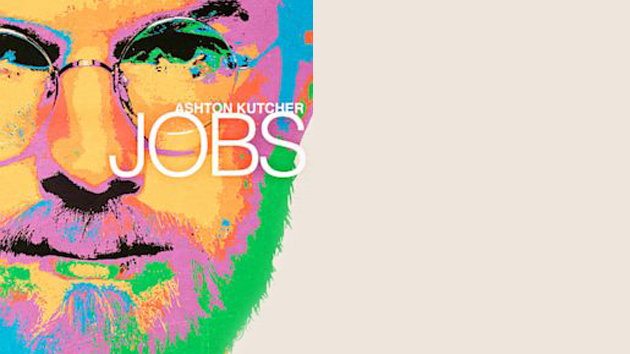
Premise
This biographical drama charts the rise of Steve Jobs (Ashton Kutcher), co-founder of Apple, from his early days as a college dropout to his transformative influence on the personal computer industry.
It highlights his turbulent relationship with Steve Wozniak (Josh Gad), the genius engineer behind early Apple products, and explores his sometimes ruthless quest for innovation.
Director
Joshua Michael Stern (known for “Swing Vote”)
Cast:
- Ashton Kutcher as Steve Jobs
- Josh Gad as Steve Wozniak
- Dermot Mulroney as Mike Markkula (early Apple investor)
- J.K. Simmons as Arthur Rock (venture capitalist)
- Matthew Modine as John Sculley (Apple CEO)
Where to Watch:
Trailer:
Why It’s Relevant for Software Testers:
- Visionary Drive: While the film delves into Jobs’ controversial personality, it showcases his relentless drive for perfection, reflecting the ambition at the heart of many tech innovators.
- Product vs. Engineering: The tension between Jobs’ focus on design and user experience versus Wozniak’s engineering-centric approach highlights the potential clash between these crucial elements of software development.
- The Power of Simplicity: The film emphasizes Apple’s focus on intuitive, user-friendly products, underscoring the vital importance of thorough user experience (UX) testing.
- Legacy of Innovation: Regardless of one’s opinion on Jobs himself, it’s undeniable that Apple reshaped the industry, pushing constant improvement and redefining standards in technology.
- Historical Context: The film offers a glimpse (though somewhat dramatized) into the early days of the personal computer revolution, a useful historical perspective for those in the field.
Important Note: “Jobs” received mixed reviews due to its portrayal of historical events and figures. It’s best viewed as a semi-fictionalized depiction that emphasizes Jobs’ impact on the technology world, rather than a strictly accurate biography.
#18) Tron
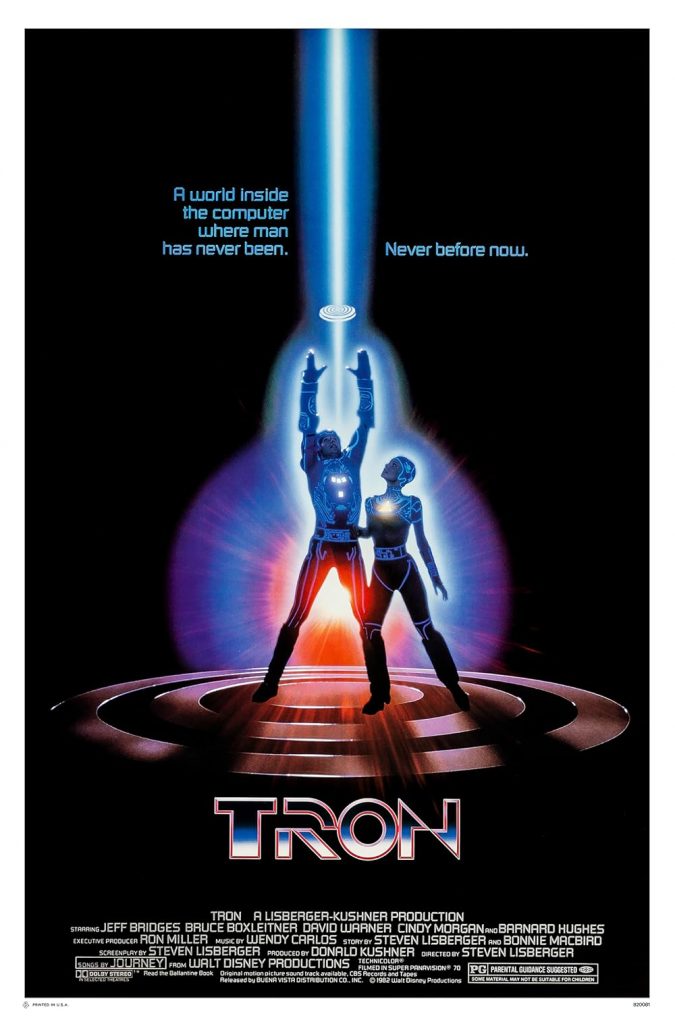
Premise: Kevin Flynn (Jeff Bridges), a rebellious computer programmer, finds himself digitized and transported inside the world of a powerful mainframe computer. He teams up with security programs like Tron (Bruce Boxleitner) to battle the oppressive Master Control Program (MCP) and escape back to reality.
Director: Steven Lisberger (his feature film directorial debut)
Cast:
- Jeff Bridges as Kevin Flynn/Clu
- Bruce Boxleitner as Tron/Alan Bradley
- David Warner as Ed Dillinger/Sark/MCP
- Cindy Morgan as Lora/Yori
- Barnard Hughes as Dr. Walter Gibbs/Dumont
Where to Watch:
Trailer:
Why It’s a Landmark Film for Software Testers:
- Early Vision of Cyberspace: “Tron” was groundbreaking in its depiction of a digital world within a computer system, visualizing data, software, and processes as living entities.
- Programs as Characters: The concept of anthropomorphizing programs offers a unique way to think about software interactions and their potential for agency.
- User vs. System: Flynn’s struggle against the MCP represents the battle between a user trying to exercise control and a system that may have its own goals, foreshadowing later concerns about AI.
- Visual Innovation: “Tron” pioneered the use of computer animation alongside live-action, pushing the boundaries of special effects in cinema at the time.
- Cult Classic Status: The film’s unique aesthetic, electronic score, and concept have solidified its cult status, sparking the imaginations of generations interested in the intersection of technology and visual storytelling.
Important Note: “Tron” was created in the infancy of personal computers. While revolutionary in its visual style, its representation of computing is more metaphorical than technically accurate.
Also Read:- Check Out Programming Memes that Will Make You Go ROFL
#19) Disclosure
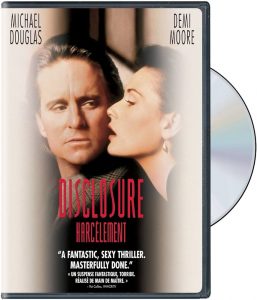
Premise
Tom Sanders (Michael Douglas), a rising star at a computer technology company, finds himself the target of a sexual harassment accusation by his new boss, Meredith Johnson (Demi Moore). When he’s passed over for promotion, he suspects retaliation and digs deeper, uncovering a conspiracy that could put his career and personal life at risk.
Director
Barry Levinson (Academy Award Winner known for “Rain Man” and “Wag the Dog”)
Cast
- Michael Douglas as Tom Sanders
- Demi Moore as Meredith Johnson
- Donald Sutherland as Bob Garvin (company CEO)
- Caroline Goodall as Susan Hendler (Tom’s wife)
- Roma Maffia as Catherine Alvarez (investigator)
- Dylan Baker as Philip Blackburn
Where to Watch
Trailer
Why It’s Relevant for Software Testers:
- Power Imbalance in the Workplace: “Disclosure” explores how office hierarchies can be exploited, with accusations used as weapons for personal or professional gain. This serves as a reminder of ethical responsibility in the often competitive tech world.
- The Manipulation of Digital Evidence: The film features staged virtual reality scenarios used to frame Tom, highlighting the potential for technology to be used for deceit and the need for careful verification processes.
- Corporate Culture and Ethics: The film exposes the cutthroat environment of a tech corporation, where ambition and unethical actions can lead to coverups and abuse of power.
- Pioneering Its Topics: While controversial at the time, “Disclosure” was one of the first mainstream films to tackle sexual harassment with a male victim, and it sparked wider conversations around workplace dynamics.
- Dated but Important: The film’s portrayal of technology might feel dated, yet the core themes of power, manipulation, and ethics within corporate settings remain relevant.
Important Note: “Disclosure” contains mature themes and depictions of sexual harassment that could be triggering for some viewers. While it generated important discussions, the film’s execution has been criticized. Yet, it offers a starting point for conversations about workplace harassment dynamics and the potential for technology to be misused.
#20) TPB AFK – The Pirate Bay Away From Keyboard (2013)

Premise
TPB AFK: The Pirate Bay Away From Keyboard (2013) is a compelling documentary that delves deep into the heart of digital piracy, freedom of information, and the legal battles faced by the founders of The Pirate Bay (TPB), one of the world’s most notorious file-sharing websites.
Directed by Simon Klose, the film offers an unprecedented behind-the-scenes look at the lives of the site’s co-founders during their trial in Sweden, where they were charged with copyright infringement, ultimately challenging global conversations about copyright and the open internet.
Director: Simon Klose
Featuring:
- Gottfrid Svartholm as Himself
- Fredrik Neij as Himself
- Peter Sunde as Himself
- Various legal and technology experts
Where to Watch:
Trailer:
Why It’s Relevant for Software Testers:
- Ethics and the Digital Age: TPB AFK presents a nuanced discussion on the ethics of file sharing, copyright laws, and digital content distribution, prompting viewers to consider where they stand on these pivotal issues.
- Understanding the Impact of Digital Platforms: The documentary showcases the power and reach of digital platforms and the challenges they pose to traditional copyright laws, highlighting the ongoing battle between technological innovation and intellectual property rights.
- Legal and Moral Complexities: By following the trial of The Pirate Bay founders, the film explores the legal and moral complexities of the internet, offering insights into how laws struggle to keep pace with technological advancements.
- Community and Culture in the Digital World: TPB AFK illustrates the strong community and culture that can form around digital platforms, emphasizing the role of user-driven sites in shaping the internet landscape.
- Inspiration for Digital Activism: The documentary serves as an inspiration for digital activism, encouraging viewers to think critically about internet freedom, privacy, and how they can contribute to the ongoing dialogue around these issues.
Important Note: While TPB AFK is celebrated for its candid look at the intersection of technology, law, and ethics, it also presents a perspective that is sympathetic to the founders of The Pirate Bay, which some viewers might find controversial. The documentary opens up a broader conversation about the future of the internet, digital rights, and how society navigates the balance between freedom of information and copyright protection.
#21) We are Legion
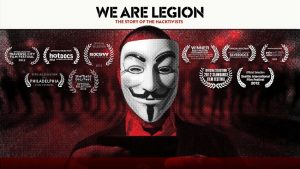
Premise
We Are Legion: The Story of the Hacktivists (2012) is a riveting documentary that dives into the world of hacktivism, focusing on the origins, ideology, and actions of Anonymous, a loosely organized collective of hackers and activists.
Directed by Brian Knappenberger, the film provides an in-depth look at the group’s evolution from internet mischief-makers to a potent political force that has taken on corporations, governments, and various institutions around the world.
Through interviews with current and former members, as well as experts and victims of the group’s activities, “We Are Legion” paints a comprehensive picture of the digital age’s most infamous hacktivist group.
Director: Brian Knappenberger
Cast
- Interviews with members of Anonymous
- Journalists
- Activists
- Experts in digital culture
Where to Watch:
Trailer:
Why It’s Relevant for Software Testers:
- Understanding Cybersecurity Threats: The documentary sheds light on the methods and motivations behind hacktivism, providing valuable insights into potential cybersecurity threats and the importance of robust security measures.
- Ethical Implications of Technology: “We Are Legion” prompts viewers to consider the ethical implications of their work in technology, especially regarding privacy, free speech, and the power of digital platforms to effect social and political change.
- The Power of Collective Action: The film illustrates the impact that a decentralized group can have on global events, highlighting the potential for collective action through digital means.
- Cultural Impact of Hacktivism: By exploring the culture and ethos of Anonymous, the documentary offers a unique perspective on how digital communities can influence societal norms and values.
- Inspiration for Advocacy and Activism: For those interested in the intersection of technology and social justice, “We Are Legion” serves as an inspiration for leveraging technical skills in advocacy and activism.
Important Note: While “We Are Legion” provides a fascinating look into the world of hacktivism, it also presents complex moral and legal questions about the tactics and impacts of Anonymous’s activities. The documentary encourages viewers to reflect on the balance between digital freedom and the rule of law, making it a thought-provoking watch for anyone interested in the future of the internet and digital rights.
The list doesn’t end here.. Here are some other programming movies which we think are good choices to satisfy the programmer in you
- Middle Men (2009)
- The Internship (2013)
- Pirates of Silicon Valley (TV Movie 1999)
- Startup.com (2001)
- Good Will Hunting (1997)
- 21 (2008)
- Wall Street (1987)
- Twelve Monkeys (1995)
- Infinity (1996)
- Breaking the Code (TV Movie 1996)
- Cube (1997)
- Pi (1998)
- 23 (1998)
- The Bank (2001)
- Pay It Forward (2000)
- Minority Report (2002)
- The Code Conspiracy (2002)
- Equilibrium (2002)
- The Time Machine (2002)
- Cube²: Hypercube (2002)
- Fermat’s Room (2007)
- The Number 23 (2007)
- Wall Street: Money Never Sleeps (2010)
- Moneyball (2011)
- Travelling Salesman (2012)
- Live Free or Die Hard (2007)
- TRON: Legacy (2010)
- Digimon: The Movie (2000)
- Ghost in the Shell (1995)
- Revolution OS (2001)
- Paranoia (2013)
- Untraceable (2008)
- We Live in Public (2009)
- The First $20 Million Is Always the Hardest (2002)
- The Bourne Ultimatum (2007)
- Source Code (2011)
- Paycheck (2003)
All these programming movies are fun to watch but at the same time are informative as well. Hope you find it useful.


 Software Testing Events
Software Testing Events App Testing
App Testing Web App Testing
Web App Testing Game Testing
Game Testing Automation Testing
Automation Testing Load Testing
Load Testing Security Testing
Security Testing Performance Testing
Performance Testing Hire a Tester
Hire a Tester





